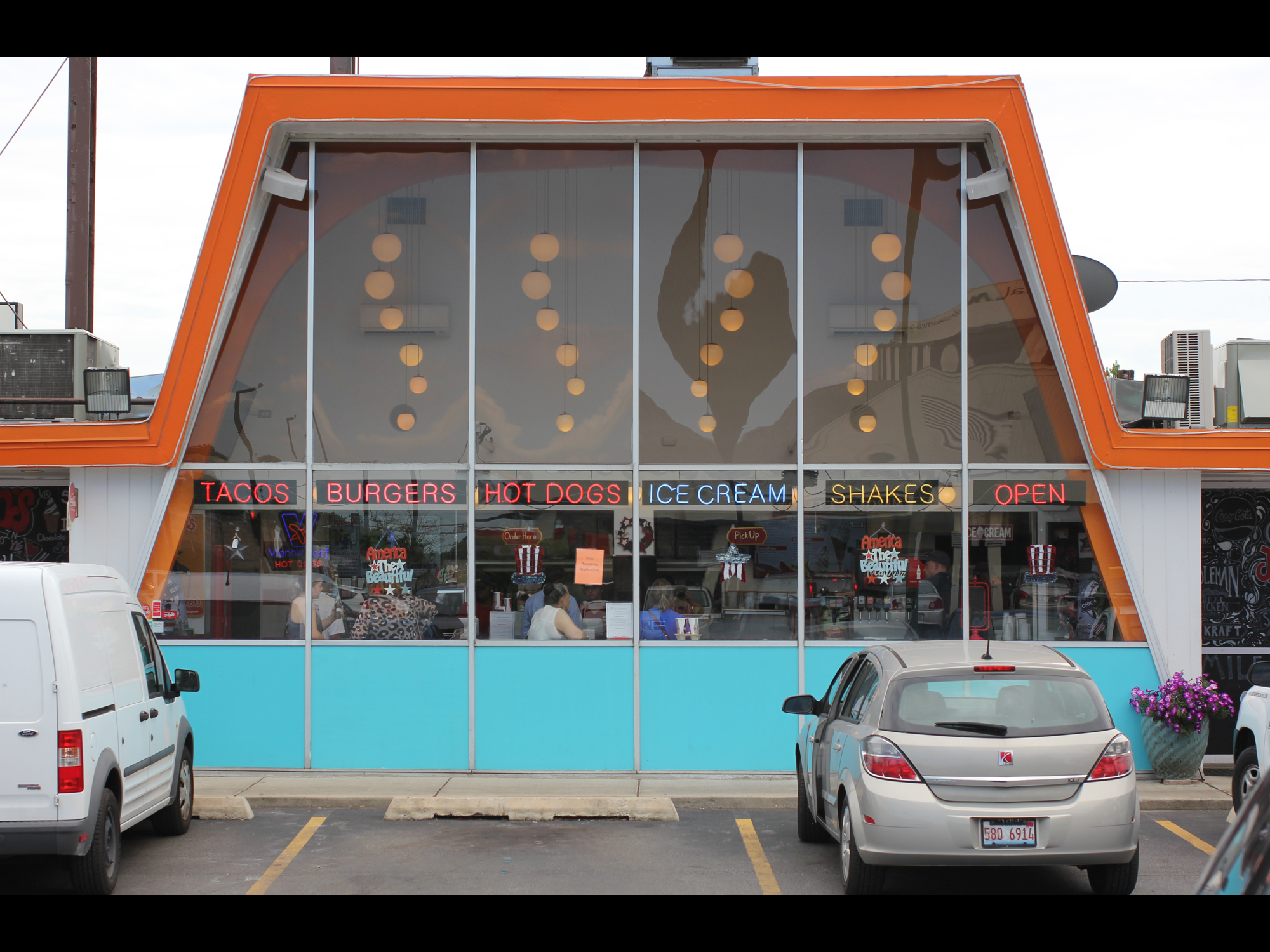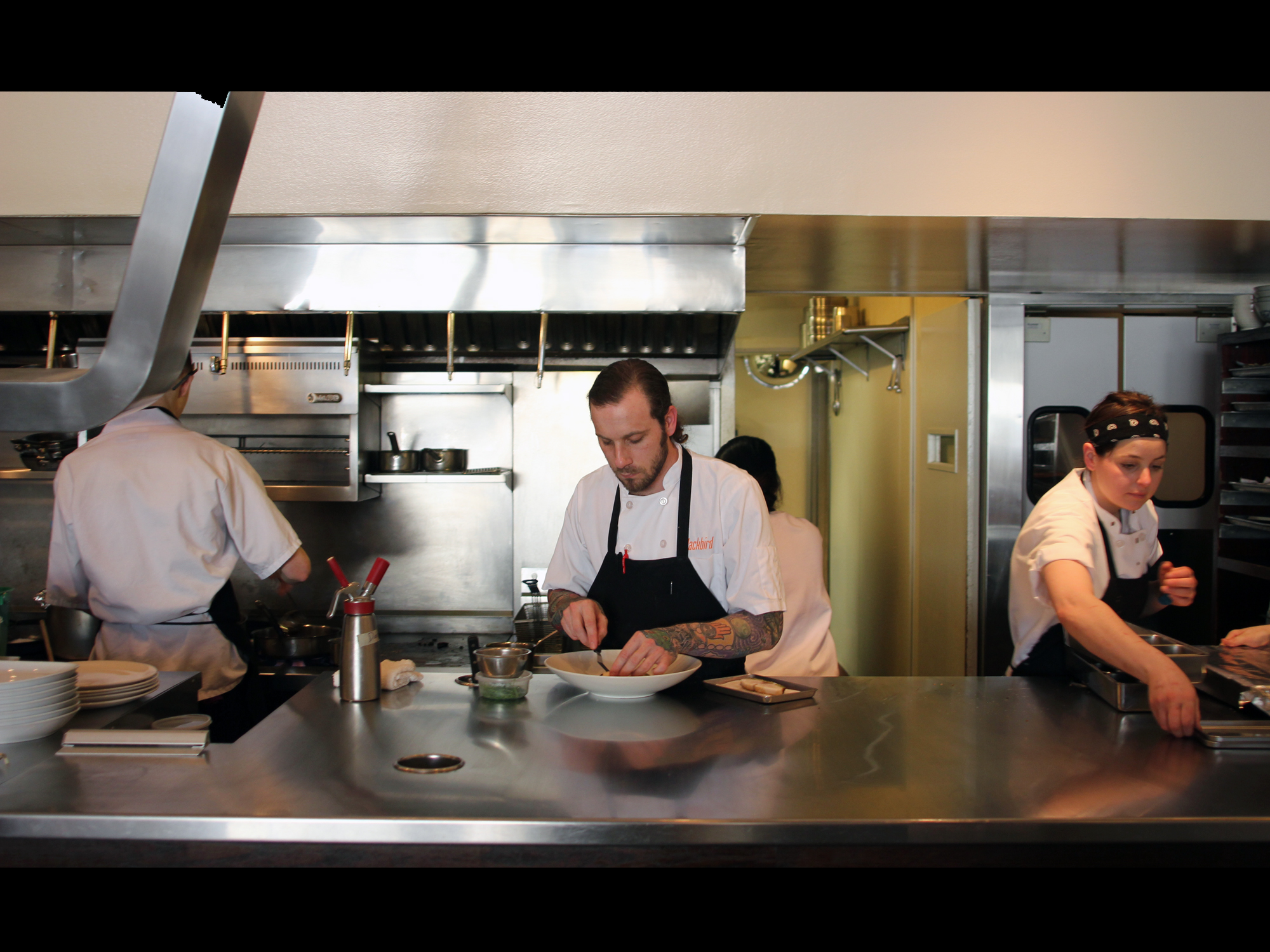JASON VINCENT AND I ARE OF THE SAME generation of cook. We both have humble beginnings—him as a pizza cook in Cleveland, Ohio and me as a dishwasher in Urbana, Illinois; we’re close in age and share the same alma mater, the Culinary Institute of America in Hyde Park, New York. We came up in the age of ring molds and tall food, and saw the Kellers beget the Achatzes.
We also lived through the breakdown of fine dining and were part of a generation of young chefs who wanted to cook great food, but in a more relaxed atmosphere, eschewing the suited servers, tablecloths, chef coats, ring molded tartar and outrageous price tags. We wanted to be cooks, not chefs. We wanted to be ingredient focused, not presentation focused. We wanted to give the farmers and producers a voice. We covered our walls with reclaimed barn wood and lit our dining rooms with Edison bulbs and exposed our wood grills to our diners.
Jason and his business partner, co-chef and best friend Ben Lustbader are excellent cooks and have a very focused, synergistic system of checks and balances in the kitchen—plus a kindred partner in the dining room in Joshua Perlman. At Giant they have assembled a team that is dedicated, professional and outwardly joyful, and right out of the gate have been firing on all cylinders. They have built a dining room that is modern and stylish, but also comfortable and fun and inviting. The kitchen is exposed, but that isn’t the focus of the room. There is no wood fired grill or oven, no house charcuterie or house kimchee and the ingredients on the menu have no provenance listed. There’s not an Edison bulb to be seen.
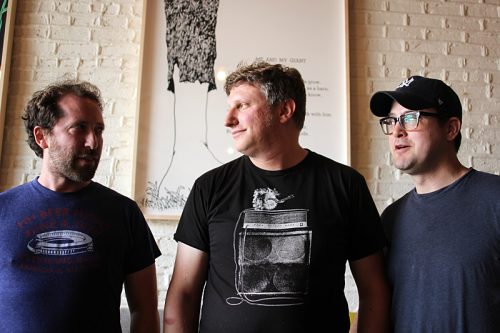
Jason Vincent. Ben Lustbader, Rob Levitt. Not pictured because he has work to do: Josh Perlman
There is, however, humor and personality. There is good music and great wine and an undeniably positive energy in the room. Josh and his crew serve, clear and pour effortlessly and with no regard to who is responsible for which table, but rather a, “This is our dining room and we will take care of everyone” mentality. A glance into the kitchen is like watching Charlie Parker’s rhythm section—a group of guys sweating and straining and pushing to keep up, but all the while having a great time working together and putting every ounce of themselves into every plate they serve.
People keep asking Jason what he did with the last two years since Nightwood closed, as though he became reclusive. He was, in fact, being a father and a husband.
We are now at a place where fine dining is making a comeback and chefs are once again chefs, wielding tweezers and hydrocolloids while sourcing from farms and cooking in open kitchens over live fire. In some cases, it is a confluence, and in some a disaster, but none of that is Jason Vincent’s focus with Giant. My conversation with the Giant boys was a lot of insider talk about how terrible the pool of cooks nationwide is and why, and about service and food philosophy—the usual chef talk. But we also talked a lot about people and kids and family. About what Jason and Ben and Josh want to see come from all this.
Giant wants to change the culture in which a young cook considers it a privilege to step into the kitchen of a dining temple—and hopes to last a year so he can add it to his resume. They aim to make it a place where you can learn and contribute and have a life for the long term. A place to nerd out on food and wine—and the perfect place to bring your kid, because why shouldn’t kids eat food cooked at this level, too?
People keep asking Jason what he did with the last two years since Nightwood, the Pilsen restaurant where he made his name, closed, as though he became reclusive. He was, in fact, being a father and a husband. Of course he was thinking of his next move, but he wasn’t about to rush into anything. Enjoying life while still wanting to cook for people evolved into a business plan. He wanted to create a place where everyone can live happily and evolve organically. That could someday produce like-minded but independently spirited offspring. Ben summed it up best—the goal with the three of them and the whole Giant team is to “make happy.”
Here’s the conversation we had one morning, sitting around Giant drinking PBR.
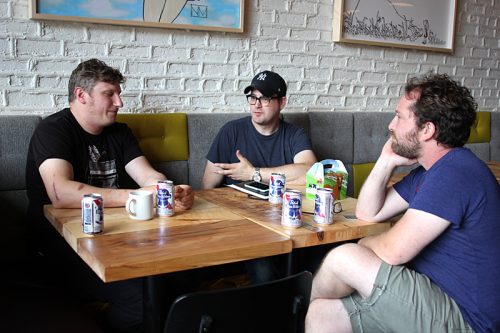
LEVITT: When Nightwood first opened the food was very local ingredient-driven, very simple and straightforward—not conceptual. And it seemed like it changed over the five years you were there—as you got better known, and interacted more with your peers on social media, your food evolved. You were manipulating food more than you used to—I think of the carbonara you did, a classic dish but presented in a very different way—a sheet of pasta with a solidified carbonara sauce piped inside, rolled into a coil, sliced and topped with clams and lemon.
You seemed to be evolving in a direction—and then you took two years off, and the menu here seems back to that intention of making simple, delicious, normal food.
VINCENT: The on-the-plate perception of simplicity is kind of always going to be there, but the bells and whistles on the plate are hidden. Take the barbecue sauce on the ribs, for example—there’s 40 ingredients in there, somewhere around there, and it’s very very specific and grammed out and we spent a lot of time coming up with it. But we knew the end goal—the end goal had to taste like barbecue sauce. So that’s how we had to get there.
Personally, that’s maybe what I learned over that whole up-and-down process at Nightwood. You can’t just throw your dick on the table and say, This is what we’re making! There needs to be head, heart and dick. Simplicity is very attractive to us, but then, we’ve been open a week, we haven’t seen what a winter looks like. In the wintertime, we could be a lot slower, we could have a lot more time to do tweezer food. But it’s not interesting to us. Perfection is boring.
But I don’t see that as nerd science cooking hidden by simple-looking food. I see that as you guys being smart, with everything grammed out to ensure consistency, to achieve a goal. I mean, how many ingredients are there in a black mole? It’s complex, yet chicken in mole is fundamentally a simple dish.
That’s a good point. And we’re also coming at it from the position of a business owner. You can say that this is what your head, heart and dick all say you should do, but put yourself in the seat and ask yourself, is this what the customer wants? And if you say no—
LUSTBADER: I think that was one of the big changes that first year at Nightwood. We were militant about, Sorry, bartenders, no lemons, they don’t grow around here. Nichols just ran out of onions, I guess we’re not going to use onions. At some point your dogma is punishing the customer. So we tried to find compromises that we were comfortable with. Like Rushing Waters trout is amazing, but we were starting to have our fill of it and I’m sure the customers were too. So let’s find a responsible fish from a little further away.
When we opened Mado, we were very much of the same mentality, we’re not going to use these products because they don’t grow around here. And we went through the same thing too. But I like lemon, so I’m going to use it. I like olive oil, so I’m going to get good olive oil.
VINCENT: Well, and we looked at each other and said, what about sugar? What about coffee, what about chocolate?
You can make smart decisions on this—
LUSTBADER: Right. I believe in international trade! (laughs)
VINCENT: And at the end of the day, we’re here to make the customers happy. We have 16, 17 things on the menu right now, and the idea is, they get a bunch of stuff. If they get five things and they like three of them, we blew it. They have to like them all. This isn’t like Maslow’s Hierarchy of Needs where one of them’s met and then the others move into a different position. Our goal is to make every one of them the best. I’m not comfortable with, the wine was amazing, and the service was amazing, and the vibe was genial, and three out of five things that I had were really good.
LUSTBADER: I think for me it’s not just that we want to make the food that we like, but increasingly as I get older and we work together longer, I want to cook the food that people want to eat. I want to provide you with the meal that’s going to make you happy, that’s my goal in cooking now. Not, how can I make this balance on top of that, or use this ingredient that I never heard of? That’s just kind of self-indulgent. The goal is to incorporate Josh, to incorporate all of our staff, in how do we make food that… makes happy?
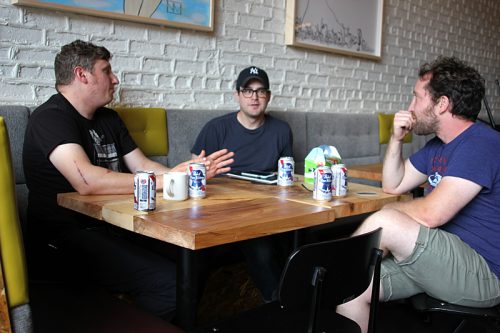
I think that’s the way food is evolving. People our age are cooking differently from the way we did when we started cooking, and differently from when the chefs we worked for started cooking. When we started it was all about high end, and then when we started running kitchens it was all about the most basic, simple, opposite of that, and now there’s this balance in the middle.
You see guys like Matt Jennings who opened Townsman—you would have expected him to go from his places in Rhode Island [Farmstead and La Laiterie] to the high end in Boston, and instead he made it more fun, and more about the whole and about the experience. More about enjoying really delicious things that all kinds of people can enjoy. I don’t know the guy, though there’s some talk about him coming here to do a dinner at Local Foods. But I follow him on social media and what he’s done with his restaurant and the evolution of his career, I see how much time he dedicates to his family and how much he makes it about his staff as much as it’s about him, it’s a change in the way things are in this industry.
We’re seeing a push towards the very high end again, but we’re also seeing this midrange level making high quality cooking and experiences accessible. A year from now we’ll see how your efforts are reflected in Chicago being even more of a leader in that kind of good dining in this country. And everything we’ve been talking about is leading toward a mental shift for this industry—to just do better by everybody.
VINCENT: That’s the thing, man. The old guard and “this is how it is,” blah blah blah—it kills people. This is stressful enough, and adding that stress—fuck that. Just for the sake of ego—that’s crazy.
LUSTBADER: But I think we see that starting to get stripped away by people our age who went through that and kind of came to conclusions that, “I bet I can run a kitchen differently, and still achieve the level of quality I’m looking for.” Like I just worked at Publican Quality Meats with a bunch of people who were ten years younger than me, who were way better than I was at that age.
And I think that’s due to people our age figuring out how to communicate better. They’re able to learn so much faster. Plus all the access to information that’s out there, the amazing breadth of cookbooks that people have access to, the internet, YouTube, all that kind of stuff. But I think in kitchens, peoples’ learning experiences are dramatically different because they’re just absorbing so much more information now—because they’re not terrified.
It’s tough because the good ones, who get all that, are phenomenal. You have these kids in their 20s who just soak it all up—
VINCENT: Well, and the cookbooks and YouTube are great, but—
LUSTBADER: —it can’t be a substitute for your time in the kitchen.
VINCENT: We’re going to set up a system where every single person in the restaurant stages, for a week, every year, somewhere. We send them, we pay for it, we set them up with it or they set themselves up. That’s real life information.
To be honest, it’s not necessarily for the guys who are back in the kitchen, it’s for the people who don’t even work here yet. The kids who are going to come in when we need to hire someone new or whatever, I can picture the conversation—”I just saw this thing on YouTube, I just got this new cookbook” or whatever, and the old dog in the kitchen says, “Well, I just went to Spain and worked for a week, this is actually what happens.” Hopefully it’s a punch in the face for that kid so he says, I want to stay here for a year so I can do that. It’s stopping the millennial slide [from one job to the next].
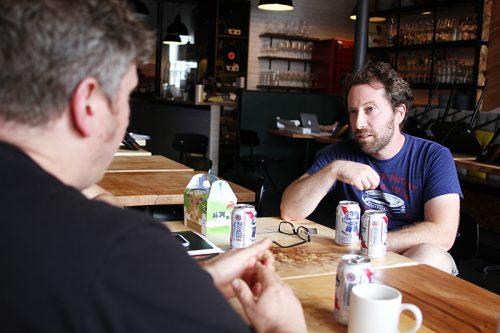
It’s important that someone is cognizant of that. We’ve had plenty of stages from people who say, I’m a line cook at Alinea or wherever, and I don’t ever get to touch beef. Butchering’s important and I want to learn more about it, can I come in. We had a guy, a kid, he was like 22, and he would come in and cut with us until noon, and then get on his bike and go work a shift at Alinea until 3 am. I can’t imagine having that kind of energy…
VINCENT: After the past week, I definitely do not have that kind of energy.
But we’re seeing more of these high end restaurants opening, and young guys are going there to build their resumes because they think what they’ve seen on YouTube is really cool, tweezers and immersion circulators and all that stuff—
And it is! You can’t deny that it’s cool. And probably delicious and when it’s executed correctly, it’s fucking amazing. And when it’s not… which holds true for everything. If it’s not done 100%, it sucks.
And the difference is, when I was in high school, I didn’t care about food—I got into it because I needed a job. But now it’s on TV, it’s in magazines, and they go to culinary school and they immediately go to a place like Alinea, and that’s where they start learning. And it’s difficult because they’re set with very specific tasks. And then they want to work at a place like Giant, and they don’t really know how to cook anything. There’s no depth. They know how to make CIA Skills Level 1 food—
Mmm, concasse! I love concasse.
The old guard and “this is how it is,” blah blah blah—it kills people. Just for the sake of ego—that’s crazy.
LUSTBADER: I think there’s also a misunderstanding. I mean, conceptual food is conceptual because there is a lot of depth. You listen to Ferran Adria talk about where his ideas come from, they’re all based in very traditional cooking, and he’s just expanding the dialogue tenfold, but he can trace it all the way back to some traditional Catalan dish or whatever. And I think that’s what a lot of these young kids are missing. Which is that you don’t just jump into something conceptual for the sake of concept. The really great stuff still has a lineage that you can trace, and it’s a comment on something that had come before it.
That’s why I was never the musician that I wanted to be. Because I started out playing the saxophone like Coltrane in the late 60s, but I didn’t really want to study all the people that came before him. And that was a definite gap in my education—I thought I could play free jazz, but I couldn’t play in a dance band, because I couldn’t play in time for people to dance to.
Where being a dishwasher was what made me think, if I keep going, if they make me a prep cook, and then I get to work the line—somehow it was made very clear to me that it’s very important to dress a salad properly. It might just be a green salad, but it’s the first thing people eat and there is something to dressing it properly.
VINCENT: That’s an interesting point, and the thing I keep thinking about is that Flynn McGarry kid, the kid star chef—I’ve never eaten his food, and I’m not hatin’ on him for doing what he wants to do. But I read an interview where he said, why should I go work for another chef when I’m already a good chef? And it’s just such a dumb 16-year-old thing to say, and I’m not saying that he’s a dumb 16-year-old, I’m saying he’s 16, so he’s dumb.
The reason to work for another chef is to get to know them to the point where they open up about something as simple as a salad. Because I guarantee you nobody’s saying, okay Flynn, do your prep list, and then I’m going to have time to schmooze with you about what I actually cooked myself for dinner last night at my house. Those are the tidbits that actually open things up.
You can read online what a chef is making at the restaurant. You can email him and say, how’d you make this. You can buy his cookbook. But you can never get into his head, like that, just doing a stage, or talking with him and giving him the “yes, chef” for five minutes. And if you don’t have those building blocks, then—what does that kid make himself for dinner? Is he handing out strawberry and anchovy terrine and blah blah blah? Does he know how to make a green salad properly?
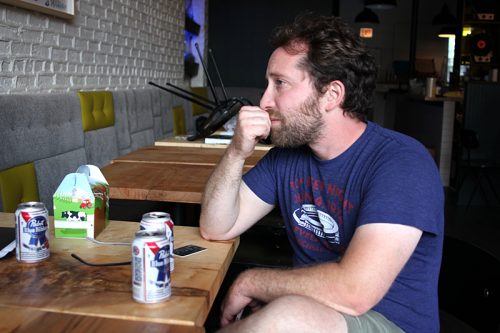
Let’s switch gears. I’m interested in what this place means to you.
VINCENT: Well, it obviously means a lot, it’s our first restaurant. It’s one of those things that you think about, or try not to think about, for years and years and years. When the first customer sat down it was a pretty overwhelming feeling.
But I think the thing that Josh, Ben and I are trying to do is to not make it about us. Not hold a premeal meeting and say, I’m so proud because this is the first place that I’ve owned—we didn’t say that shit, even though we were tempted to. But that’s not important. How it feels to us is personal, and it’s about us, but saying it’s ours in front of a shift—that’s counterproductive. We want it to be theirs. Kitchen, head down, let’s work, front of the house, head up let’s work, knock it out of the park. And they’ve killed it, it’s been awesome.
You were out of the kitchen for two years, Jason, What’s the best meal you had in the last two years?
In Chicago it was definitely Momotaro. I think what that guy’s doing over there is absolutely insane. It’s exactly what I like, not necessarily as Japanese food, although it’s really interesting and all that stuff. But it’s the simplicity. It looks real simple on the plate, but then you eat it and you’re just, holy fuck, I cannot imagine what went into this.
Outside of Chicago, I think Rustic Canyon wine bar in Santa Monica is probably really really high up there.
Who’s the chef there?
Jeremy Fox. But it’s the same thing—everything there looked incredibly simple, but when you taste it, it’s just like, holy fucking shit, what is this?
LUSTBADER: I was at that meal, there was a polenta that was just super, super good polenta, lots of depth of flavor, and then we asked about it. He starts it with strawberries—it’s not pink, there’s no hint that it’s there, and once they tell you it’s there and you taste it again, it’s like oh, I guess I can kinda… it’s a perfect example of the smart thing you do because you’re an experienced cook, and I’m only going to experience it as, that was delicious.
VINCENT: Delicious enough that we wanted to ask about it. It was not run of the mill delicious polenta. Which is satiating, satisfying, very visceral—but this was to the point where you’re like, what is it?
It really goes back to, underpromise and overdeliver. That has been a win for us so far, we’re a small place that could be viewed as exclusive because you can’t get a reservation—but only because of the size of the place. And then you get here, and you look at the menu and there’s nothing over twenty bucks—if I were in the seat at that point, I’d be like, whew, great, let’s eat a bunch of stuff!
It’s the Ikea theory, everything seems so cheap, but it adds up.
This is built to stay together a little bit better. Although there is horse in everything (laughs)
When I asked you about the best meals you had, the answer came back, not surprisingly, in terms of dishes you ate. Was there any other element that influenced you—some aspect of service, the wine glasses, advice you were given, anything like that?
You know, I ask everyone in the world for advice, and the thing about asking for advice is that you have to actually process it. Even if it’s advice you immediately disagree with. I’ve never run a business, Ben’s never run a business, it would be silly not to ask for a lot of advice and process it fully.
The biggest piece of advice I got, and I’ve told the staff this, was sitting down with Rick Bayless a couple of years ago. We’re sitting at Frontera, and I just said, what do I do? This was after [being a best new chef in] Food and Wine, and [winning] Cochon 555, and he was kind enough to just sit down and give me serious advice.
And one of the things he said was, no matter who you are or what you are as a cook, you gotta understand that half of the people who come in to eat at your place don’t give a shit about the food. They want the vibe, and they want the wine, and they want the service, and they want to be taken care of and all that stuff. And this is a chef who is doing however many millions out of his restaurants. And for somebody who’s that successful to say that, that reset my priorities.
And Paul Kahan sat me down and said, you can go into this as a cook, but it’s a three-headed monster—you’ve got to have somebody in the front, you’ve got to have somebody in the office, and you’ve got to have somebody in the kitchen. Or else one of them is going to fail, and if one fails it all crumbles. Those two conversations really reset me.
I think the advice that you get that’s the least appealing is the stuff you have to pay the most attention to.
Absolutely. Because you really have to mind-grind whether it’s good advice. There’s bad advice, but if somebody tells you something you don’t want to hear, nine times out of ten it’s good advice. Because it’s hard enough for them to say, so you should listen to it.
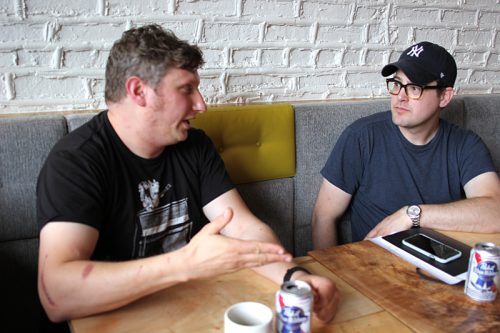
Enough about you, JV. Let’s talk about Ben. You were at Lula, then at Nightwood, and you’re here now. He’s going to get the media attention, but you’re a partner, which is really cool, I always like seeing the other people get some of the credit. But what does that mean for you?
LUSTBADER: JV and I met at Lula, what, eight years ago, nine years ago, and my name wasn’t forward in the press but I was present for all of that. We went to Cochon together, when he had all the post Food and Wine events, I was running the kitchen at Nightwood. So now I’m here and I’m co-chef, and that’s awesome. I had a productive couple of years in between, I worked at Publican Quality Meats through the whole duration, I worked at City Farm for part of that time, I worked at Bang Bang part of that time, just trying to fill in some gaps in things that I hadn’t been doing.
But conceptually, in terms of your working relationship, how does that work?
JV and I work together really well as a team, but not because we’re the same person. We have many overlapping but a lot of complimentary skill sets.
So it’s like a happy marriage? Checks and balances?
VINCENT: I think it’s more that we’re happy dating and we don’t need to be married. We’ve dated for a long time and we really like it. We pay each others’ bills. It’s more common law. (laughs)
LUSTBADER: You make it sound so passionless!
VINCENT: We’re really close friends. The first week at Nightwood, we went out for drinks after and said, if I ever do something you don’t like, you tell me. And since then we’ve done exactly that. We care about each other and want the same thing, and now that we’re business partners it’s more intense because there’s more riding on it, but it doesn’t change our friendship. It’s more intense for me because before, I wanted him to tell me if I put food up that he didn’t agree with, but now I need him to tell me. We have different heads on our shoulders, and both of them are good heads but we need each other.
LUSTBADER: I think that’s right. JV is my friend, and I wouldn’t be doing this if that weren’t true. I am dedicated to this industry and this life, but just the way that I’m wired, I’ve never really been interested in opening my own place—”this is mine!” Since my first day of cooking it’s always been, it would be so cool to open a place with a friend someday.
VINCENT: Well, and this one too (gestures toward manager and co-owner Josh Perlman, working on his laptop in the corner). Not to turn into Tom Cruise here, but he completes us. To talk about the overlap, he’s put up dishes. He’ll come back and taste something and say, I wish it was this. And he’s saying it from a customer’s perspective, or his own perspective.
So JV, have your kids been in to eat?
VINCENT: No, I have dreams and my wife has dreams of, 5:00 comes around and the four of us squirrel away at that table over there, and I make them some noodles or some chicken fingers or whatever. My wife has a glass of wine—not like a full meal, but a half hour, 45 minutes of family time.
But we’ve been busy at 5:00! I might have to block that table.
I love bringing my daughter out to dinner, though she doesn’t always like going. She loves to eat, well, she likes food, but she doesn’t always want to eat it, she likes playing or coloring. She’s four, she should. But I do love the idea that she is able to come and see me at work more often, and she has no weird feelings about what I do for a living, and she and Alli sit down and eat every Saturday, and it’s really fun to be able to have them come in and be part of what I do for a living. So I think that’s important as a chef, and if there’s a plan in place for it that’s really admirable. I don’t know that I would bring Avery here—
We have Happy Meals.
You do?
[Jason reaches onto a shelf and produces a box.]
Josh put them together. We have Happy Meal boxes with like crayons in them. We are absolutely, 1000% kid friendly.
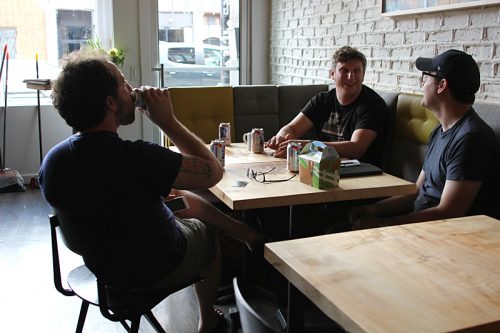
That is so great. She’ll lose her mind over this. We go to Cemitas Puebla over here every couple of weeks, and she likes the food, but more importantly she likes the skeleton coloring sheets.
But it’s important for me to have food at this level accessible to kids, just because this is what real food is. You can go to the most high end places, and if you have kids, they’ll break out the Sysco chicken fingers. That you say we’re going to do all this really cool, important stuff, and our barbecue sauce has 40 ingredients in it—to have that mentality but then also be like, bring your kids—is new to me. That’s not something that chefs of our age seek out to do.
And it’s good that it’s so small, because if you can’t restrain your kid, they can’t go anywhere.
But kids don’t need to know the technique that goes into our onion rings, they just know they taste like onion rings.
LUSTBADER: Adults, too.
Rob Levitt is the founder and Head of Butchering at The Butcher & Larder at Local Foods. His writing has been featured on Food Republic, Jettison Quarterly and Ruhlman.com.
COVER IMAGE: Jason Vincent, Ben Lustbader, Rob Levitt and Josh Perlman.
Latest
Join the Discussion
After you comment, click Post. If you're not already logged in you will be asked to log in or register with Disqus.





